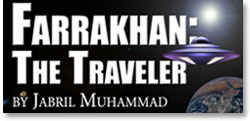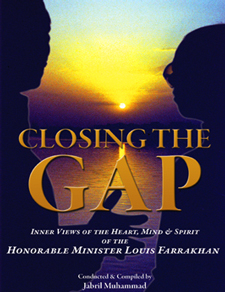Patience, judgment, ego and life's testament
By Jabril Muhammad | Last updated: Jul 15, 2019 - 11:29:02 PMWhat's your opinion on this article?
[Editor’s Note: This is a reprint and was published online December 12, 2008.]
 Generally, the word “plausible” is taken to mean: “believable and appearing likely to be true, usually in the absence of proof; having a persuasive manner in speech or writing, often combined with an intention to deceive.”
Generally, the word “plausible” is taken to mean: “believable and appearing likely to be true, usually in the absence of proof; having a persuasive manner in speech or writing, often combined with an intention to deceive.”
The Urban Dictionary defines “plausible” to mean: credible, plausible appearing to merit belief or acceptance; “a credible witness;” “a plausible story” likely, plausible=within the realm of credibility; “not a very likely excuse,” “a plausible story” probable, likely, plausible probable, likely, plausible likely but not certain to be or become true or real; “a likely result;” “he foresaw a probable loss” apparently reasonable and valid.
Early in 1966 the Honorable Elijah Muhammad told me, on the phone, that he was told a “plausible lie” on a serious matter. A few days later I received a letter, from him, that deepened my understanding of a “plausible lie.” This is leading the world into the most of all dreadful events.
Please, study the words of the Honorable Minister Louis Farrakhan.
On 93 of Closing The Gap, we read: English dictionaries are inadequate to define the state of mind in the word “judgmental.” So, I asked my Brother and Minister. Ponder the wisdom of his answer.
Brother Jabril: Brother Minister, yesterday, in a limited way, we discussed the state of mind of one who is judgmental. You mentioned a tendency in human nature, which the word ‘haste’ defines. You mentioned history’s judgment on the judgmental contemporaries of certain kinds of persons and why. Please comment.
Minister Farrakhan: Let’s start with the word ‘tendency.’ There is a natural tendency in the human being to look at a circumstance, an event, or a person and hastily make some form of judgment. Oft-times when that person comes closer to the subject, digs deeper into the event or the circumstance, they recognize that their first judgment was improper, incorrect.
This tendency that exists causes the human being great trouble because unfortunately, when we make a hasty judgment of an event, a circumstance, or a person, our ego can get involved in that judgment and therefore, that judgment could be a blinding factor in our properly relating to the event, the circumstance, or the person.
There is in human nature, as the Holy Qur’an teaches us, that the man is made in haste. This is why the Qur’an counsels us to gain the quality of patience. If we were by nature patient, we would not make hasty judgments. But because by nature, we are hasty, then we make hasty decisions based on hasty judgments.
I find, in my experience with our people and with human beings generally, that that tendency is real in everybody. It takes great discipline to withhold the tendency, or to control the tendency to make snap judgments without having not some of the facts, but as many of the facts that are possible to be known. This is why I believe that the Bible teaches, “Judge not lest you be in danger of judgment.” Because no matter what we think we know, only God knows all of the factors in an event, in a circumstance and that which is in and surrounds a person.
Only God, the Best Knower, is qualified to really make a judgment. His judgment, then becomes a trial for the judgmental, because He sees so much when He judges, that it takes the hasty judgmental person time to catch up to the wisdom involved in a judgment, or a determination made by God, and they may do much harm to themselves and others until they catch up to His judgment.
This is why most great men are never properly seen by their contemporaries. The veiling of divinity, by the flesh and the drives of the flesh, causes people to be blinded by the flesh, making hasty judgments of that which is divine. So great men have to be judged by history, not by their contemporaries.
When our Beloved Brother, Martin Luther King was assassinated, and I looked at his funeral on television and began to weep, and I asked the Honorable Elijah Muhammad, why did I react like that, when we thought so differently from Dr. King? He said, “As long as the testator lives he is writing his testament.”
The testator is the person, who every day of his life, is writing his testament. Life takes so many twists and turns that one can never fully know a person until death puts a period to the writing. He said, “Then the historians come and gather all of the bits and pieces of evidence of this person’s life and work. Then the historians assign this person his or her place in history.”
So in truth one can never receive ones’ reward while one is alive. Your true reward comes after death has put a period to your testament and others can now view your life, its work, its impact, starting with the gathering of as many of the facts as can be known. Those facts give the person who reads them and digests them, maybe a totally different view of the person, or the event, or the circumstance, than (from) the contemporary, who lived when that person was a part of that event and was a part, or an observer of that circumstance, whose judgmental state of mind miss-judged.
So in concluding my answer to that question, it would seem to me that none of us is truly capable of making a true judgment. And none of us is patient enough to wait for God to judge an event, a person and a circumstance. So history will always be correcting our judgments.
 |
Inner Views of the Heart, Mind & Sprit of the Honorable Minister Louis Farrakhan |
On page 95 of Closing The Gap [we read]
Brother Jabril: Would you say that in a limited circumstance, we can make true judgments, but not the truest judgments?
Minister Farrakhan: In a limited circumstance, we can make true judgments, but oft-times our egos are so wrapped up in the judgments that we make, we never leave room in our judgment for the possibility of mistake or error. That is the tragedy of judgment.
This is why, in my mind, to be made a judge of the human condition, is one of the greatest honors that can be bestowed on a person. But when you are made a judge, you are in the greatest position to come under the judgment of God.
So when I see a person robed in the garment of a judge, I often wonder how bias, how prejudice, how status symbols, how the nobility of a person, or the lack of it, enters into the judge’s decision.
So when God says, “Judge not lest you be in danger of judgment,” we ought to speak less, and think more, and desire to know as much as we can about the circumstance, the event, or the person, before we open our mouths to make a judgment.
That, unfortunately, is not always done. And unfortunately, this will always be the human condition, until we become so humble and righteous in character, that we desire to do no man or woman wrong.
So then we must speak less and we must counsel more, and do it with patience. This is what I find in the Qur’an that God is consistently counseling us to learn to be patient.
More next issue, Allah willing.
INSIDE STORIES AND REVIEWS
-
-
About Harriett ... and the Negro Hollywood Road Show
By Rabiah Muhammad, Guest Columnist » Full Story -
Skepticism greets Jay-Z, NFL talk of inspiring change
By Bryan 18X Crawford and Richard B. Muhammad The Final Call Newspaper @TheFinalCall » Full Story -
The painful problem of Black girls and suicide
By Charlene Muhammad -National Correspondent- » Full Story -
Exploitation of Innocence - Report: Perceptions, policies hurting Black girls
By Charlene Muhammad -National Correspondent- » Full Story -
Big Ballin: Big ideas fuel a father’s Big Baller Brand and brash business sense
By Bryan Crawford -Contributing Writer- » Full Story






 Click Here Stay Connected!
Click Here Stay Connected!








